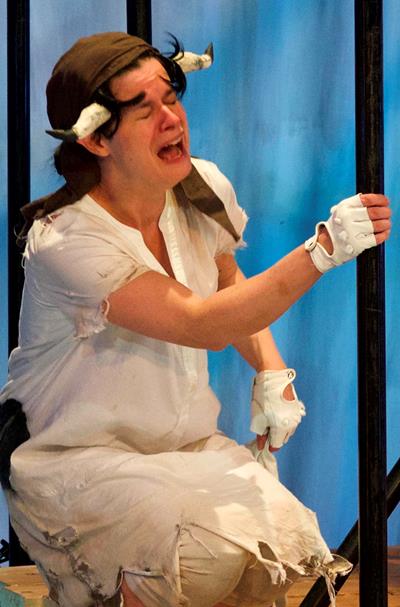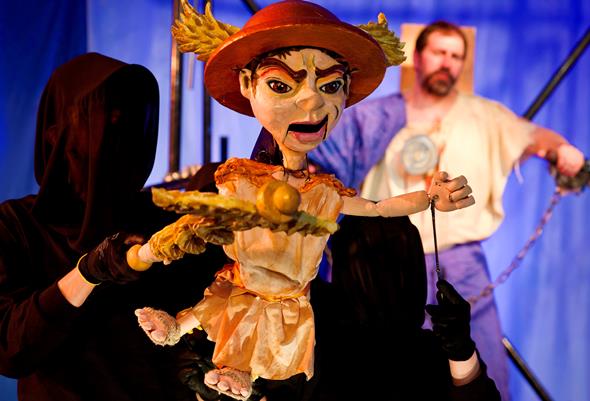‘Prometheus Bound’ at City Lit: Bringer of fire
to humanity brings down the hot wrath of Zeus
“Prometheus Bound” by Aeschylus, world premiere of new translation by Nicholas Rudall, at City Lit Theater through June 10. **
By Lawrence B. Johnson
In ancient Greek mythology, the god Prometheus handed over to humankind the sacred and closely guarded treasure of fire. For that rash act, Prometheus paid a bitter price exacted by the god-king Zeus: He was pinioned to a rock for all time, and by the most unpleasant means of a stake through his chest.
 The old story, old even in fifth century B.C. Greece, was the basis of Aeschylus’ drama “Prometheus Bound,” which City Lit Theater has revived in the puppet-enhanced world premiere of a new translation by Nicholas Rudall, the University of Chicago classics scholar who was the founding artistic director of Court Theatre eons ago (albeit on the A.D. side of history).
The old story, old even in fifth century B.C. Greece, was the basis of Aeschylus’ drama “Prometheus Bound,” which City Lit Theater has revived in the puppet-enhanced world premiere of a new translation by Nicholas Rudall, the University of Chicago classics scholar who was the founding artistic director of Court Theatre eons ago (albeit on the A.D. side of history).
Aeschylus was the earliest of the classical Greek dramatists whose works have survived. He apparently wrote some 70 plays, of which seven have weathered the two and a half millennia since his time. Not the least of Aeschylus’ contributions to modern drama was the addition of a second actor; until that radical departure, Greek plays were populated by one characters interacting with a chorus.
The chorus remained as a key part of Greek theater, and indeed it plays a major role in “Prometheus Bound,” punctuating the impinged god’s understandably peevish harangue with commentary, speculation and moralizing.
Chastened Prometheus (the physically imposing Mark Pracht) gets a number of visitors, including the mortal Io, who’s not in such a good way herself. She has been transformed into a cow by Zeus in an attempt to hide his dalliance with this mortal from his wife Hera. But seeing through the ruse, Hera seized the cow (poor Io) and set a gadfly upon her to drive the cow/girl mad.
 Thus Io (Kat Evans, got up as a cow, down to her hooves) comes upon the miserable Prometheus. As she rants and whimpers about the unkindness done to her (having no empathy left over for this guy with the stake through his chest), Io constantly – and I do meaning ceaselessly – swats at that vexing gadfly. Honestly, I thought I might go nuts before Io did. A bit less gadfly and a little more clarity and purpose in Evans’ speech would have been helpful.
Thus Io (Kat Evans, got up as a cow, down to her hooves) comes upon the miserable Prometheus. As she rants and whimpers about the unkindness done to her (having no empathy left over for this guy with the stake through his chest), Io constantly – and I do meaning ceaselessly – swats at that vexing gadfly. Honestly, I thought I might go nuts before Io did. A bit less gadfly and a little more clarity and purpose in Evans’ speech would have been helpful.
Clarity and purpose are the very strengths of Charles Schoenherr, who provides the voices for the two splendid puppet emissaries of Zeus who drag Prometheus to his rock of perpetual suffering.
While the reluctant Hephaestus, blacksmith of the gods, dithers and delays, Power (the embodiment of Zeus’ will) recaps the case against Prometheus and insists that this justice be carried out. Schoenherr’s voicings afford a vivid distinction between the two huge puppets – which are managed by operators clad head to foot in black.
Two other puppets, beautifully crafted and again in Schoenherr’s voices, also swing by to chat with Prometheus. Oceanus, who personifies the river that flows around the edges of the earth, rides in on a sort of outsized seahorse; and in the end, the winged messenger Hermes darts in to give Prometheus a tongue-lashing on Zeus’ behalf: Eternity is going to be slow and painful for this unrepentant traitor.
A leisurely, chatty visit also is made by the 3,000 daughters of Oceanus – symbolized by three stylized water droplets attached to illuminated seedlings. These also are puppets, whirling about Prometheus’ rock as they press their unsolicited counsel of deference to Zeus, humility and obedience. They are voiced in speech raised to song, composed by Kingsley Day and sung by a chorus of women whose performance is more earnestly expressive than musically burnished.
 Throughout this rather busy day at his rock, Prometheus patiently indulges his prating visitors, both grand and humble, but essentially has the same answer for them all: He possesses the gift of prophecy and he knows the winds of fortune will shift — for everyone. Zeus is going to need his help. Yeah, sure, he’s going to suffer for a while on the endless continuum of the immortals. But his day is coming, his release destined.
Throughout this rather busy day at his rock, Prometheus patiently indulges his prating visitors, both grand and humble, but essentially has the same answer for them all: He possesses the gift of prophecy and he knows the winds of fortune will shift — for everyone. Zeus is going to need his help. Yeah, sure, he’s going to suffer for a while on the endless continuum of the immortals. But his day is coming, his release destined.
Rudall’s new translation is fetching in its modern vernacular. The speeches resonate with scholarly depth and theatrical savvy — the very distillation of Rudall’s long career and esteemed work in both worlds.That said, Pracht’s Prometheus becomes a bit monotonous in his wry tone, his chuckling dismissal of an ostensibly perpetual imprisonment. Mere petulance must stand for this god’s immense pride, and sniggering for his supreme confidence. He conjures more of a local lout tossed into the cooler for the night than a sly hero who knows that time and circumstance will eventually come round to his favor.
Director Terry McCabe has perhaps found greater inspiration in the puppets than in Prometheus’ grand anguish. The meager set designed by Jeremy Hollis arguably suffices for the classical Greek theater at hand. And the puppets, created by Vonorthal Puppets, hold the imagination like the meddling, prating immortals they represent.
Related Link:
- Performance location, dates and times: Details at TheatreInChicago.com
Tags: Charles Schoenherr, Jeremy Hollis, Kat Evans, Mark Pracht, Nicholas Rudall, Terry McCabe


